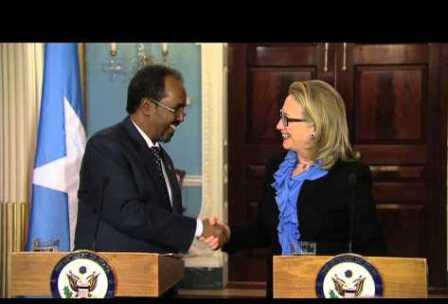Somalia’s Quest for Stability Wins U.S. Accolades

January of this year marked a new chapter in Somalia’s quest for stability and security. It is the classic case of the African news that never was. For one thing, whereas the story was reported by many news media outlets, the full impact of the change in the country is yet to be visible to the outside world, and so it seems like nothing really happened. But indeed change is taking place in Somalia.
For the first time since 1991, the United States formally recognized Somalia’s government under the leadership of President Hassan Sheikh Mohamud. The renewed partnership between the United States and Somalia continues both nations’ steady fight against terrorism and the establishment of stability through democracy.
A statement by former U.S. secretary of state, Hilary Clinton applauded the work in Somalia. “Since the start of Obama’s Administration, Somalia was in many ways a different country than it is today. People and leaders of Somalia have fought to bring greater stability, security, and peace to their nation,” Clinton said.
Much of Somalia’s political landscape has been bombarded with corruption rooting from the 21-year rule of dictator Mohamad Siarre Barre. The early 1990s brought new challenges to the forefront of Somali governance when coalitions of opposing clan units overthrew the government ousting Barre. This time in Somali history was fraught with numerous failed attempts to establish a sound governance structure, which led to an increasing number of human rights atrocities.
Perhaps the most tumultuous event was the 1993 Black Hawk Down attack, which created strained relations between the U.S. and Somalia. Eighteen U.S. soldiers were killed when helicopters were gunned down in a battle to capture two of the self-declared president, Mohamad Farrah Aidid’s lieutenants.
As a result of the battle, the U.S. pulled out of the country prior to completing its humanitarian and security objectives. The event marked Somalia’s descent into utter chaos with the next two decades enthralled in battles with Islamist militant groups such as Al Shabaab who sought to establish control in Mogadishu and other major cities.
As of 2009 terrorists controlled Mogadishu and the majority of the central and southern parts of the country.
Since then, significant strides have been made through the collective effort of the international community and the African Union, dedicated to laying a foundation for a solid Somali government to ensure a halt to human rights abuses and the establishment of sound regional security.
The African-led leadership of Somalia’s Transitional Federal Government and the African Union (regional countries such as Uganda, Burundi, Djibouti, and Kenya) have proved to be invaluable in increasing stability within the region. With their combined effort, they have been able to drive out Al-Shabaab militants who had seized control of Somalia’s major cities.
The push for stability in Somalia has opened up pathways for further support from the international community, and as Clinton stated, “humanitarian aid has begun to get where it needs to be and local governments have resumed their work creating opportunities for increased travel and commerce.”
